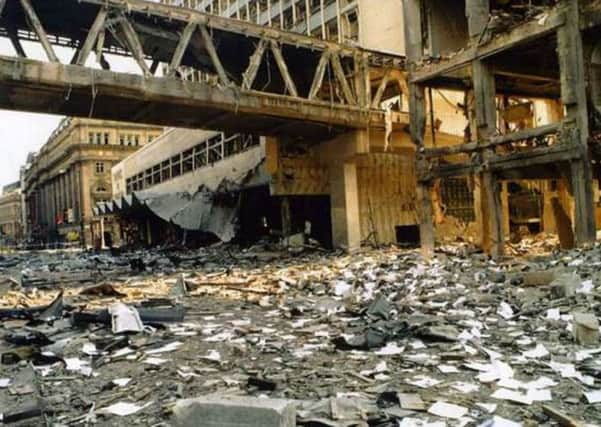Ben Lowry: Hypocrisy over Manchester is just one example of IRA distortion of history


Attacks in the area include, famously, the 1993 murder of two boys at Warrington.
The bombings came at a phase of the IRA campaign when it was trying to over-ride Sinn Fein’s failure at the ballot box to become the largest nationalist party, and was trying to scare Great Britain into submission.
Advertisement
Hide AdAdvertisement
Hide AdBut the outrage this week merely touches on a scandal much larger than republican hypocrisy over Manchester.
Our whole approach to the Troubles has become hopelessly distorted.
While elderly soldiers face trial for split-second Troubles shootings, little progress is being made solving IRA crimes against civilians that in ought to be tried before an international court: Bloody Friday, Claudy, Birmingham, Kingsmills, La Mon, Harrods, Enniskillen, Teebane, Shankill.
Those are just the biggest atrocities. I was talking with colleagues recently and got confused between IRA bombs at the News Letter and Belfast Telegraph so I checked what happened where: in the News Letter attack seven people were slaughtered in 1972 (none staff, but the dead included people who were trying to get away from the scene, such as a man, 65), at the 1976 Bel Tel bombing only one died (an employee).
Advertisement
Hide AdAdvertisement
Hide AdThese are mere footnotes in a list of terrorist crimes against humanity, including heinous loyalist massacres of civilians. But the IRA deserves special mention because it pushes a self-justifying narrative on the past.
Some apologists accept IRA assurances that they did not intend to kill civilians or that their warnings were mishandled (ie, the state’s fault, of course). But that explanation is hardly helped by the fact that Ulster victims of the above massacres were overwhelmingly Protestant.
The IRA’s political wing, instead of running scared from its record of bloodshed, is so untroubled by the mooted legacy structures that it has been demanding – actually demanding – implementation of those bodies as a key demand in Stormont talks.
If such bodies are to be implemented we must answer a question that Trevor Ringland has repeatedly posed: is there a will to jail ex-IRA members of Sinn Fein?
Advertisement
Hide AdAdvertisement
Hide AdIf not, then why do we tolerate charges against soldiers and all the money spent chasing past state actions?
In addition to the millions of pounds of taxpayer cash that has been spent in Northern Ireland courts funding (via legal aid) actions against the state over Troubles killings, and after the hundreds of millions of pounds spent on Bloody Sunday, there is also money being spent on historic Police Ombudsman investigations of Troubles allegations against the RUC and further money on the PSNI legacy branch investigations into nine legacy directions by the Public Prosecution Service (six of which relate directly to Troubles allegations against the state, and three of which relate to Stakeknife, a major focus of which is alleged state wrongdoing).
This newspaper has reported that at least 35, and up to 41, of 94 deaths marked for special scrutiny in legacy inquests were of terrorists.
We are running a series by a distinguished lawyer, Neil Faris, questioning whether separate inquests is the only way to resolve such cases (click here for the second part in the series).
Advertisement
Hide AdAdvertisement
Hide AdAmid the heavy focus on past violence by the security forces, the proposed Historical Investigations Unit (HIU) is the key body that might be able to start getting justice for the mountain of unsolved terrorist crime. But some people who closely follow legacy fear HIU might end up focusing on police and Army.
There are various reasons why such a scenario could happen, including the fact that the state is an easier target and used agents and has records. Some legal minds I have talked to think it will be hard to put in legal safeguards against a disproportionate HIU focus on the state (London, however, is confident HIU can be set up so this does not happen).
After Manchester, it is crazy that we have to check that HIU will focus on terror.
While in England the population is demanding assurances that everything be done to keep people safe from terrorist mass murder, while police across Europe and America are doing the same, we are doing almost the opposite over the Troubles terrorism.
Advertisement
Hide AdAdvertisement
Hide AdOur lopsided scrutiny of the forces who kept us safe for decades is happening almost 16 years after September 11 2001 revolutionised global attitudes to terror.
It is happening when terrorism is viewed with even greater contempt around the western world than it has ever been before.
The state killed 10% of the Troubles dead, but most killings were legitimate so state culpability is much smaller than that. These are the forces that prevented civil war. Yet this legacy scandal is barely featuring in the election.
• Ben Lowry (@BenLowry2) is News Letter deputy editor